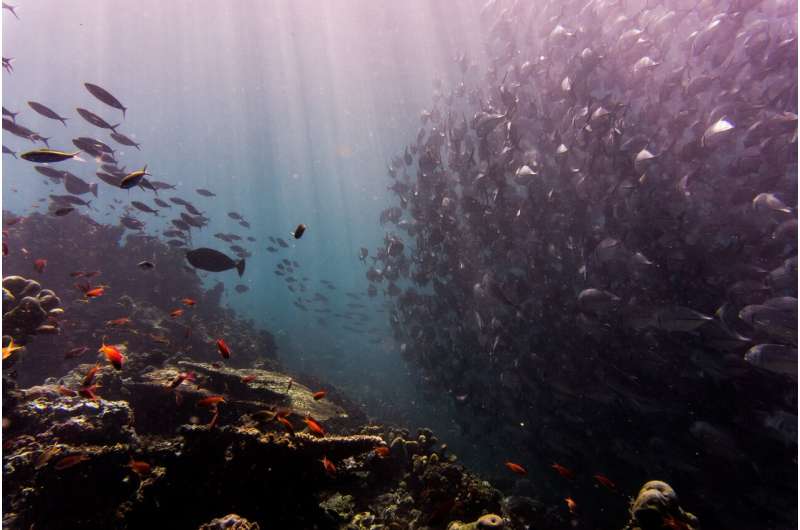August 23, 2022 report
Study shows 90% of marine species at risk of extinction by 2100 if greenhouse gas emissions are not curbed

An international team of researchers has found that approximately 90% of all marine life on Earth will be at risk of extinction by 2100 if greenhouse gas emissions are not curbed. In their paper published in the journal Nature Climate Change, the group outlines their study of thousands of marine species and how greenhouse gas emissions might impact them in the future.
Greenhouse gas emissions impact the world's climate in two ways. They raise the temperature of the atmosphere (and by extension, Earth's surfaces and bodies of water) by holding in heat, and in the case of CO2 emissions, they make water more acidic, like carbonated soft drinks. And as emissions continue to be pumped into the atmosphere despite dire warnings from scientists around the world, more research is being conducted to learn about its possible impact. In this new effort, the researchers took a broad look at the impact of greenhouse gas emissions on ocean life.
The work involved estimating the impact of certain levels of greenhouse gas emissions on marine life in the future. They looked specifically at 25,000 species, including fish, bacteria, plants and protozoans living in the top 100 meters of the world's oceans. They found that under the worst scenario, in which emissions lead to global atmospheric temperature increases of 3 to 5 degrees Celsius, approximately 90% of all marine life will disappear. They also found that if emissions are cut to the extent outlined by the Paris Climate Agreement, which would keep global temperature increases to below 2 degrees Celsius, then the risk of extinction would be reduced by approximately 98%.
The researchers also found that larger top predators are more at risk than smaller predators, as are fish species in areas where they are heavily fished by humans. Those at lowest risk, on the other hand, include small, short-lived species. Notably, Earth has not seen a die-off as great as these projections since the Great Dying 252 million years ago.
More information: Daniel G. Boyce et al, A climate risk index for marine life, Nature Climate Change (2022). DOI: 10.1038/s41558-022-01437-y
Journal information: Nature Climate Change
© 2022 Science X Network




















